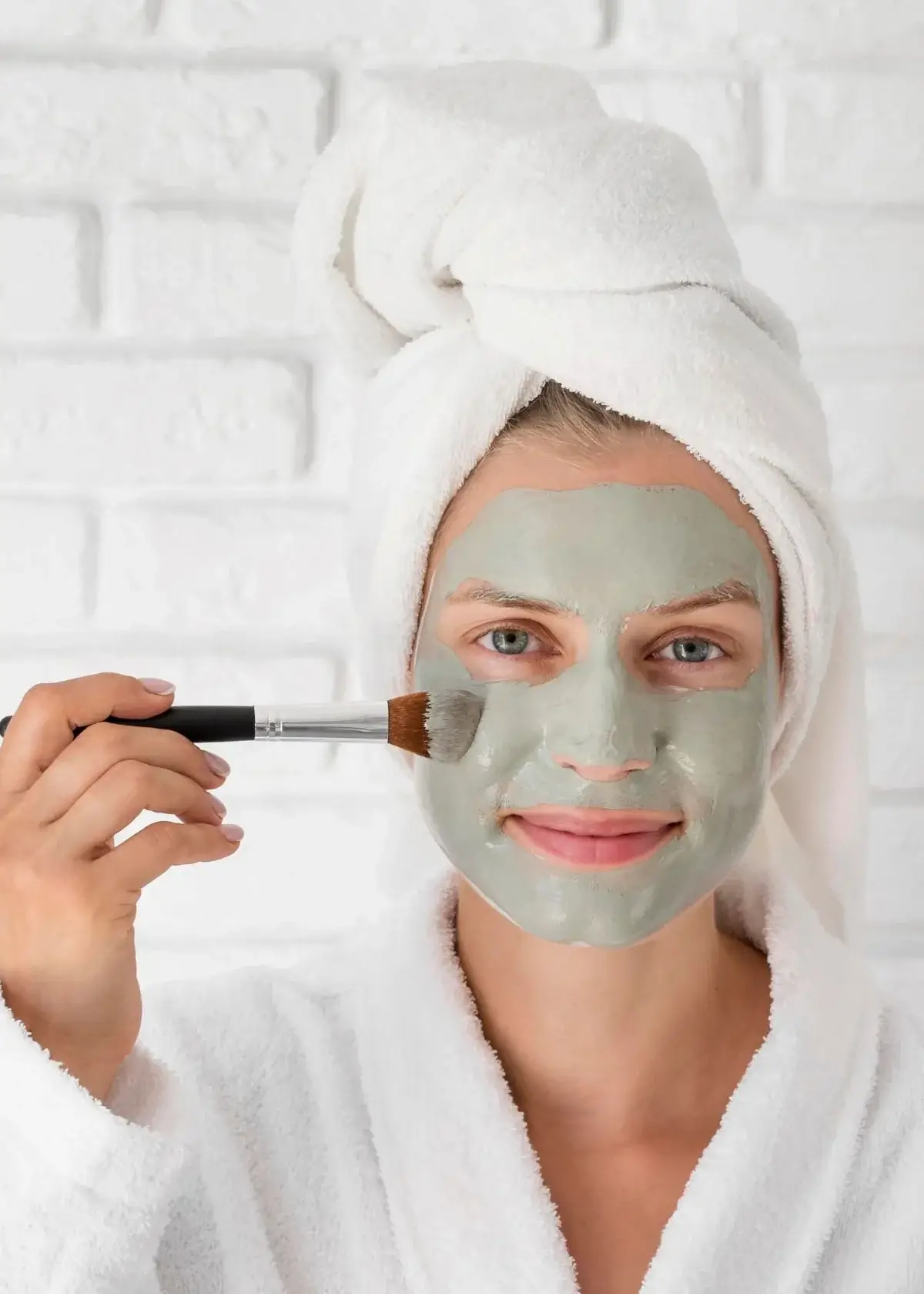Face masks can be an effective tool in your skincare arsenal when combating acne. However, with so many options available, finding the right one for your needs can be overwhelming. In this blog post, we will explore the different types of face masks, considerations for acne-prone skin, and provide tips for choosing and applying the right face mask to combat acne effectively.
Understanding Different Types of Face Masks
- Clay Masks: Clay masks are known for their deep cleansing properties and ability to absorb excess oil from the skin, making them ideal for oily and acne-prone skin.
- Charcoal Masks: Charcoal masks are excellent for drawing out impurities and detoxifying the skin. They can help unclog pores and reduce the appearance of blackheads and blemishes.
- Sheet Masks: Sheet masks are soaked in a serum and provide hydration and nourishment to the skin. Look for sheet masks with acne-fighting ingredients like tea tree oil or salicylic acid.
- Gel Masks: Gel masks are soothing and hydrating, making them suitable for dry or sensitive skin. Look for gel masks with ingredients like aloe vera or hyaluronic acid for added hydration.
Identifying Your Skin Type
Understanding your skin type is crucial in selecting the right face mask for acne. Here are some common skin types and their characteristics:
- Oily Skin: Oily skin is prone to excess sebum production, resulting in clogged pores and acne breakouts.
- Dry Skin: Dry skin lacks moisture and can feel tight and flaky. It is important to choose a face mask that provides hydration without clogging the pores.
- Combination Skin: Combination skin is characterized by both oily and dry areas. Focus on choosing a face mask that addresses the specific concerns of each area.
- Sensitive Skin: Sensitive skin tends to be more reactive and prone to irritation. Opt for gentle face masks with minimal fragrance and avoid harsh ingredients.
Considerations for Acne-Prone Skin
When selecting a face mask for acne-prone skin, it is important to consider the following:
- Ingredients to Look For: Look for face masks that contain acne-fighting ingredients such as salicylic acid, benzoyl peroxide, tea tree oil, or niacinamide. These ingredients can help to unclog pores, reduce inflammation, and control excess oil.
- Ingredients to Avoid: Avoid face masks that contain potentially irritating ingredients such as alcohol, sulfates, or artificial fragrances, as they can further aggravate acne-prone skin.
Choosing the Right Face Mask
To choose the right face mask for acne, consider the following:
- Match the Mask to Your Skin Type: Select a face mask that is specifically formulated for your skin type to ensure optimal results.
- Look for Specific Acne-Fighting Ingredients: Depending on your skin's needs, look for face masks that contain ingredients known to combat acne, such as salicylic acid or tea tree oil.
Tips for Effective Application
To maximize the benefits of your face mask for acne, follow these tips for effective application:
- Prepare Your Skin: Cleanse your face thoroughly before applying the mask to remove any dirt, oil, or makeup.
- Applying and Removing the Mask: Follow the instructions provided with the mask for the recommended application and removal time. Avoid leaving the mask on for longer than recommended, as it can lead to dryness or irritation.
- Frequency of Use: Use the face mask as directed on the packaging. Overusing face masks can potentially dry out the skin or disrupt its natural balance.
Choosing the right face mask is an essential step in your acne-fighting skincare routine. By understanding your skin type, considering acne-fighting ingredients, and following proper application techniques, you can effectively combat acne and achieve clearer, healthier-looking skin. Remember, consistency is key, so incorporate the right face mask into your skincare regimen and enjoy the benefits it brings to your journey toward a clearer complexion.
After conducting extensive research on the best face masks for acne, we have curated a list of highly recommended options. Some popular choices include the Peter Thomas Roth Therapeutic Sulfur Acne Treatment Mask, the Differin Clay Face Mask, and the Yes To Tomatoes Acne-Fighting Paper Mask. These masks are specifically formulated to address acne-prone skin and provide effective solutions. To explore the full range of options and find your new favorite face mask for acne, follow the provided link. Remember to choose a mask that suits your skin type and concerns for optimal results.
What is the best skincare routine for acne-prone skin when using face masks?
Crafting an effective skincare routine for acne-prone skin involves a nuanced approach. To unclog pores, begin with a gentle cleanser, preferably containing salicylic acid. Follow this with a non-comedogenic, oil-free moisturizer to maintain hydration without exacerbating breakouts. Integrate a targeted acne treatment, such as benzoyl peroxide or salicylic acid, into your routine. Incorporating a face mask 1-2 times a week, enriched with acne-fighting ingredients like sulfur or charcoal, enhances the efficacy of your skincare regimen. Conclude with a broad-spectrum sunscreen during the day to protect against potential photosensitivity from acne treatments.

What impact does the material of the face mask have on acne?
Delving into face mask materials reveals a significant influence on acne outcomes. Opt for breathable, natural fabrics like cotton to minimize friction, reduce irritation, and facilitate proper air circulation. In contrast, synthetic materials can trap heat and moisture, creating an environment conducive to acne development. Regularly washing reusable masks is crucial to prevent bacterial buildup and skin issues. Consider rotating between different mask options, and explore masks infused with soothing agents like aloe vera to mitigate potential irritation. Careful material selection transforms the face mask into an ally in maintaining clear and healthy skin.

What is the recommended frequency for using face masks to treat acne?
Striking the right balance with face mask usage is pivotal for effective acne management. Integrate acne-specific masks into your routine 1-2 times weekly, allowing the active ingredients to address breakouts without risking over-exfoliation or irritation. Consistency is key for sustained results, enabling acne-fighting agents to work optimally. However, moderation is equally important to prevent potential harm to the skin barrier. Tailor the frequency based on individual skin sensitivity, closely monitoring the skin's response. A measured approach, coupled with a comprehensive skincare routine, maximizes the efficacy of face masks in managing and preventing acne.

How can I incorporate face masks into my existing skincare routine for acne?
Seamlessly integrating face masks into your acne skincare routine requires strategic planning. Commence with a gentle cleanser and targeted acne treatments like salicylic acid or benzoyl peroxide. Apply the face mask 1-2 times weekly after cleansing and before moisturizing to ensure optimal penetration of active ingredients. Opt for masks containing acne-fighting agents like kaolin clay or tea tree oil for a potent yet soothing impact. Consistency is paramount for sustained results, while a compatible moisturizer concludes the routine, maintaining skin hydration and preventing excessive dryness.

How can I address acne in specific areas of my face using targeted face masks?
Tailoring acne treatment to specific facial zones demands a personalized approach. Select masks with diverse ingredients to target varied acne concerns. Salicylic acid masks effectively combat T-zone congestion, while masks infused with soothing ingredients like chamomile or aloe vera cater to sensitive areas. Integrate spot treatments or patches for isolated breakouts, ensuring precise care without compromising unaffected areas. Customization aligns the skincare routine with the skin's unique needs, promoting a balanced approach that maximizes efficacy while minimizing the risk of irritation or over-treatment.







